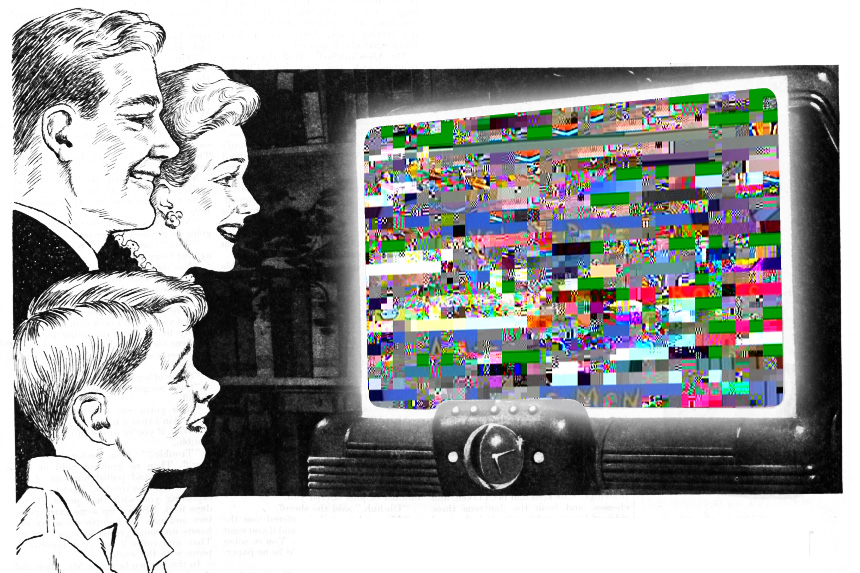I will probably never watch The Good Place. I won’t be catching up on Atlanta, and, no, I haven’t seen that one amazing show — what’s it called? Masters of Cards?
I’m not being obstinate. I’m being realistic. At the risk of coming off as simultaneously supercilious and pathetic, I must admit that I don’t have a Netflix subscription. Or Hulu. Or cable. Or Amazon Prime. Or even an internet connection.
What I do have is a library card (free) and a digital converter box (about $20). I’ve been tuning in the old-fashioned way, and my television habits have never been healthier, or stranger.
I’m not alone in opting for over-the-air television. Nielson estimates that 13.8 percent of U.S. homes rely on antennas for TV, up from 10.3 percent in 2014. Granted, this percentage was probably a supermajority several decades ago, but the unexpected increase in antennas comes as more people are “cutting the cord” on cable and picking from the ever-expanding smorgasbord of streaming options. Maybe some rabbit ears buyers just want to be able to watch the occasional awards show, news program, or sporting event in between Game of Thrones binges, or maybe, like me, they’re taking part in some voluntary simplicity.
I know what you’re thinking: Check out this smug bohemian who thinks he’s reached peak abnegation just because he doesn’t stream stuff. But — trust me — I’m not proud. I’ve “accidentally” watched The Bachelor three times and even scheduled parts of my life around reruns of Space: 1999.
Even though I’ve been partaking in the guiltiest pleasures television has to offer, I’ve found that the experience triggers less guilt, because I’m not able to binge (not that I would ever be tempted to consume hours and hours of romantic reality TV given the opportunity). With an antenna, I’m beholden to the schedule of the over-the-air overlords. When they say a show is over, it’s over, and when they say The Big Bang Theory is on, it’s time to change the channel.
But there’s another, deeper, psychological phenomenon at play. Antenna TV also eliminates the burden of “overchoice” that can accompany a streaming subscription (and especially multiple subscriptions) — a sort of paralysis and regret cycle that occurs when too many options are available. Almost 40 years ago, Alvin Toffler predicted the phenomenon in his bestselling book Future Shock: “Ironically, the people of the future may suffer not from an absence of choice, but from a paralyzing surfeit of it. They may turn out to be the victims of that peculiar super-industrial dilemma: ‘Overchoice.’” Barry Schwartz wrote more on the detriments of endless options in 2004 with The Paradox of Choice. In a TED Talk, Schwartz says, “The more options there are, the easier it is to regret anything at all that is disappointing about the option you chose.” The result is less happiness.
Even if we freedom-loving Americans think we deserve endless choices of “Cerebral Scandinavian Romances” and “Understated Gritty Tearjerkers,” we don’t actually want that much power, subconsciously. Just as Schwartz demonstrated the buyer’s remorse that comes with a saturated market, the streaming options of today can give media consumers a sort of FOMO (fear of missing out) paralysis. Just when you think you’ve chosen the right nature documentary to doze off to, it occurs to you that one of the others might feature more brutal scenes of predation. Those cute macaques no longer seem quite so amusing.
Isn’t this the idea that drives most of the drama on The Bachelor? In the current season, much has been made of professional footballer Colton Underwood’s virginity. As 30 contestants begin vying for the hunk’s love — and presumably his first roll in the sack — Colton is charged with the difficult decision of picking a soulmate from scads of beautiful women. Just when you think he is really hitting it off with Hannah G., the southern belle who doesn’t like seafood, their date ends and avid surfer Cassie is ready to show Colton what he’s been missing out on. In the end, the bachelor, statistically, is inclined to experience regret that he didn’t make the right choice, and this is amplified by the number of women available. Maybe that’s why only one winning couple in the show’s 22 previous seasons has managed to stay together. In fact, two of the show’s bachelors, season 13’s Jason Mesnick and season 22’s Arie Luyendyk Jr., have given final roses, only to call it off afterwards and choose their runners-up.
So, we are all strapping bachelors deciding between an array of suspiciously attractive women, and finding ourselves discontented with the results. I can’t say whether switching to antenna TV is the right choice for everyone, but it has allowed me to simplify my media consumption (not to mention the financial savings). I am actually reading through the massive book collection I’ve stacked up over the years, and I still catch up on new movies and shows by renting them from the library. In the same vein as vinyl records and macramé plant hangers, the antenna could become that curiosity of the past that slowly makes its way back into our homes. Maybe quaint is the new convenient.
Image by Audrey Patten
Become a Saturday Evening Post member and enjoy unlimited access. Subscribe now




Comments
While using a converter box will get you the digital channels, an inexpensive HDTV will get you much better pictures than what you currently get.
There’s nothing wrong with using the converter box and an antenna. Just because newer technology comes along does not make what you’ve been using ‘old’ or ‘obsolete’, especially if it works for you. Trying to ‘keep up’ with the ‘latest’ tech is a losing game, designed to make the companies rich and keep you poor by having you chasing the dark shadows of their greedy, never-ending game of planned obsolescence.
I use the converter box for the TV too, so I don’t have to pay for it. Ironically, I get A LOT more channels than when I was paying Time-Warner an extra $30 a month in addition to the computer and phone. One of the channels IS ‘Antenna-TV’. It’s an off-shoot of KTLA, so not sure if it’s national. Decades-TV (CBS offshoot) disappeared around Labor Day.
There’s a deluge of too much to watch and less time than ever to watch, simultaneously. My end result has been watching very little to no TV. Ironically, the last time I watched a lot of TV consecutively was the last weekend of ‘Decades’ when they were showing ‘Police Woman’ (1974-’78). Still LOVE Angie Dickinson, that show and her appearances with Johnny Carson. His show is still on nightly, on ‘Antenna’.
I subscribe to Hulu for the desktop. At $8 a month it’s worth it just to be able to see the national news when I get home (8:30-9pm) weekday nights, or try out a new show when it’s convenient.